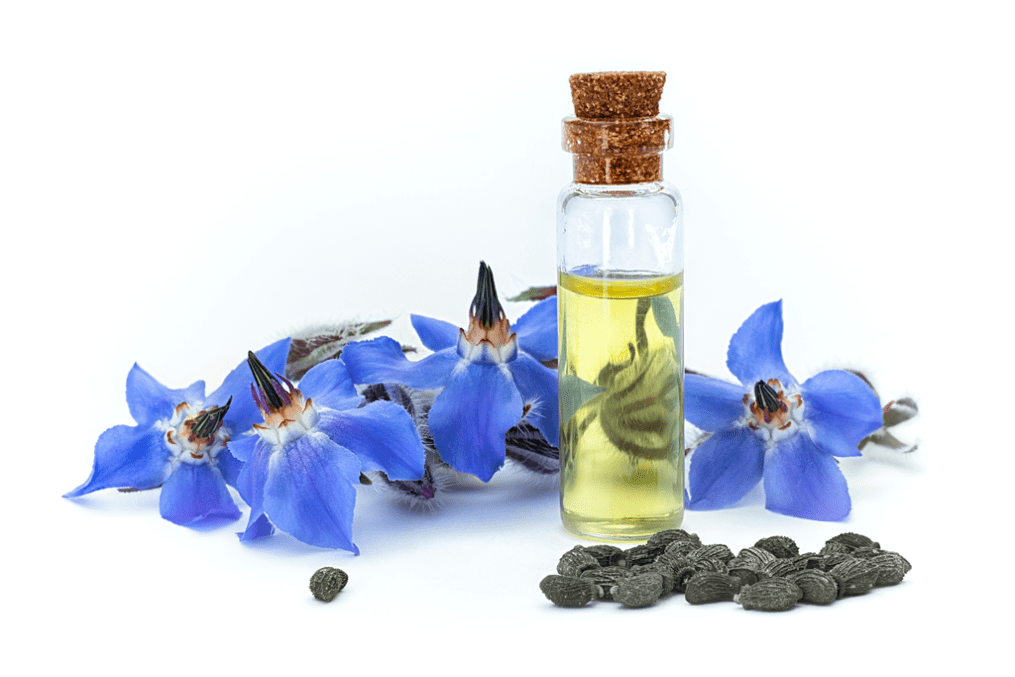What does starflower oil do?

If you’ve not heard of starflower oil before, you won’t be alone. While the plant it comes from has been used as a herbal remedy for centuries, we’re only just beginning to understand the health the benefits of its extracted seed oil. Increasingly, starflower oil is popping up on ingredients labels for beauty products and in capsules to take as an oral supplement, but what exactly is starflower oil and what are its benefits?
What is starflower oil?
It’s extracted from the seeds of Borago officinalis, or borage plant, which is native to Europe and North Africa and is sometimes referred to as starflower, due to its blue star-shaped flowers. Borage has been used for thousands of years as a natural remedy – it was mixed in the wine of soldiers to give them courage, and ancient Greek physician Dioscorides said it could ‘cheer the heart and lift the spirits’ – but we’ve only recently begun to uncover the benefits of its seed oil.
What are the health benefits of starflower oil?
Starflower oil is rich in gamma linolenic acid (GLA), an essential omega-6 fatty acid which maintains the health of cells and reduces inflammation. Regular GLA intake is believed to ease joint pain and reduce swelling. Also present in evening primrose oil, GLA is believed to help reduce menopause symptoms, such as mood swings and hot flashes, due to its anti-inflammatory properties. Additionally, starflower oil is beginning to crop up as an ingredient in various skincare and beauty products as it’s believed to improve skin health. Some research has indicated that starflower oil benefits the skin by improving its protective barrier.
Easing the pain of arthritis
In a randomised double-blind trial, the effects of starflower oil, fish oil and a combination of the two were compared as a means of treating the symptoms of rheumatoid arthritis. The research found that for all three treatment groups, symptoms of rheumatoid arthritis were significantly reduced, suggesting that a starflower oil supplement could be an effective substitute for medicative interventions.
Aiding development in premature babies
A study published by the Journal of Paediatrics looked at the use of a starflower oil and fish oil-supplemented formula to encourage growth in premature babies. Although the researchers found no significant difference in brain development, they observed a higher rate of growth and weight-gain in the babies who were given the supplemented formula, compared to those given the non-supplemented formula. The results are promising for supporting the healthy growth of preterm babies.
Treating eczema
In a 2018 review of studies into the anti-inflammatory and skin barrier repair effects of plant oils, application of starflower oil to the skin was found to be helpful for sufferers of eczema and itchy scalps. The review referenced a double-blind placebo-controlled clinical trial in which children were given undershirts to wear which were coated in starflower oil. Children who were given the coated undershirt experienced less moisture loss through the skin than a control group, suggesting that starflower oil can support the skin’s barrier function. However, an earlier review found that when taken orally, starflower oil had no significant benefits for eczema sufferers, compared to a placebo.
How much starflower oil should I take?
It’s important to remember that our bodies can only naturally produce tiny quantities of GLA, which means it must be obtained through our diet, or an oral supplement, to achieve adequate levels. However, there isn’t currently a recommended upper limit, so if you want to take starflower oil as a dietary supplement, stick to the dosage stated on the bottle. Side effects can include bloating, headaches, nausea and vomiting. If you have liver disease, or are currently taking any medications that effect your liver, or alter the ability of your blood to clot, consult your doctor before taking a starflower oil supplement. Importantly, you should never ingest the pure essential oil orally.
If you want to use starflower essential oil on your skin, make sure that it is diluted in a carrier oil first, as the pure form can cause irritation. If you notice any symptoms of an allergic reaction, including rashes, swelling, breathing difficulties, or dizziness, seek medical attention immediately.






